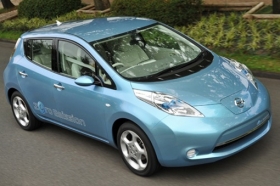Electric Cars Generate Sweet Tax Credits

The movement towards zero emission electric cars is gaining a
tremendous amount of momentum. As we move into 2010, practical electric
vehicles for the vast majority of the public will be available late in
the year with the release of the Nissan Leaf.
If you plan to purchase an electric car in 2010, you can expect a
healthy federal income tax credit to reward you. For plug-in electric
vehicles with a gross vehicle weight of less than 14,000 pounds acquired
after December 31, 2009, the maximum tax credit available will be
$7,500. The base amount of the credit is $2,500. If the car has a
battery capacity of at least 5kWh, then an additional $417 in tax
credits will be available. For every kWh of battery capacity in excess
of 5kWh, $417 will be added to the total amount. The additional amount,
based on battery capacity, over the base amount is limited to a total of
$5,000.
If you buy an electric car, charging it will be an obvious concern. Thanks to the Recovery Act, money has been allocated to build the necessary infrastructure in limited markets to support the growth of the electric vehicle. If you spend money putting in a charger, there is a 30% tax credit on the amount spent. The total credit amount is limited to $30,000 for commercial/retail installations and $1,000 for homeowners, and is set to sunset at the end of 2010.
The downside of moving into the era of the electric car is that public policy is trying to play catch-up. With every trip to the gas station, we pay a gas tax in the amount of 18.4 cents per gallon. Most of this amount (18.3 cents) is placed into the Highway Trust Fund. This fund is divided into two accounts: the Highway Account, which receives the 15.44 cents per gallon and the Mass Transit Account, which receives 2.86 cents per gallon. As you can probably guess, these accounts are used for the maintenance and improvement of the highway system and the maintenance and improvement of the mass transit system. The mass transit system obviously gets shortchanged here.
The problem with entering into the electric car era is that the Highway Trust Fund will receive less funding as we consume less gas. What this means is an increase in poorly maintained highways (just ask anyone in southern California), an increase in poorly maintained mass transit systems, and a decrease in service on those mass transit system lines. While tax increases are not popular, one solution is to increase the gas tax and shift the allocation towards mass transit over time. This may achieve a goal where mass transit lines are adequately maintained and increased and people drive less so there is less wear and tear on the highways. This is wishful thinking, but we’re all entitled to dream.
The other problems, which raise larger issues relates to sources of energy and our national grid. What energy source will we use to power our charging stations? Will the use of charging stations wreak havoc on our grid and the available supply of power?
The electric car is coming! The electric car is coming! I’m a proponent of the electric car, but this may be the case of putting the cart before the horse.
[photo credit: Nissan USA]
Copyright © 2008-2009 CleanTechies - All rights reserved To subscribe or visit go to: http://blog.cleantechies.com